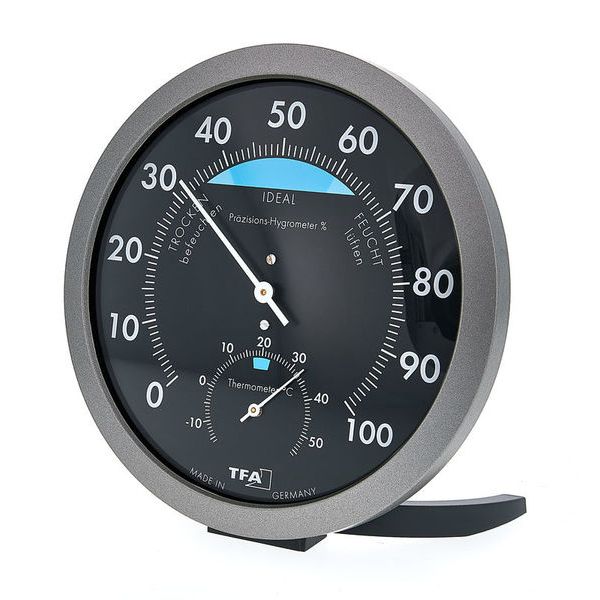Have you ever wondered if your hygrometer is really telling you the truth about the air’s moisture? If you rely on it to keep your home comfortable, protect your valuables, or care for your plants, accuracy matters more than you might think.
But how accurate are hygrometers, really? You’ll discover what affects their precision, how to check if yours is right, and the simple steps you can take to get trustworthy readings every time. Keep reading—you’ll soon feel confident knowing exactly what’s in the air around you.
Types Of Hygrometers
Hygrometers measure the moisture in the air. Different types use various methods to do this. Each type has unique features and accuracy levels. Understanding these types helps choose the best one for your needs.
Mechanical Hygrometers
Mechanical hygrometers use natural materials that change size with humidity. Hair and paper are common materials. These changes move a needle on a dial to show humidity. They are simple and do not need power. Accuracy can vary due to wear and tear over time.
Electronic Hygrometers
Electronic hygrometers use sensors to measure humidity. They often show results on a digital display. These devices are fast and easy to read. Many models include temperature readings too. They provide good accuracy and are popular for home use.
Psychrometers
Psychrometers use two thermometers to find humidity. One thermometer is dry, and the other is wet. The difference in temperatures helps calculate moisture in the air. This method is quite accurate but needs manual calculation or a chart. Useful in weather stations and labs.
Dew Point Hygrometers
Dew point hygrometers measure when air moisture condenses. They find the temperature at which dew forms. This helps determine humidity very precisely. Often used in scientific research and industrial settings. These devices require careful handling and calibration.
Factors Influencing Accuracy
The accuracy of a hygrometer depends on several key factors. These elements affect how well the device measures humidity. Understanding them helps in choosing and using a hygrometer correctly.
Small changes in any factor can affect results. Paying attention to these details improves accuracy.
Calibration Methods
Calibration sets the baseline for measurement accuracy. Different methods exist to calibrate hygrometers. Salt solutions and reference devices are common tools.
Regular calibration ensures the device stays reliable over time. Without it, readings may drift and become less accurate.
Environmental Conditions
Temperature changes affect humidity readings. Extreme heat or cold can distort sensor performance. Rapid shifts in air pressure also impact results.
Proper placement away from direct sunlight or drafts improves accuracy. Stable surroundings provide consistent measurements.
Sensor Quality
The sensor type influences how precise the hygrometer is. High-quality sensors respond faster and measure more accurately. Cheaper sensors may lag or give false readings.
Look for sensors made from durable materials. This helps maintain accuracy over long periods.
Maintenance And Handling
Keeping the hygrometer clean prevents dust build-up on sensors. Dirt can block air flow and affect readings. Handle the device gently to avoid damage.
Regular checks and proper storage extend the device’s life. Consistent care ensures accurate humidity measurements.
Common Accuracy Ranges
Hygrometers measure humidity levels, but their accuracy varies widely. Understanding common accuracy ranges helps you choose the right device. Accuracy depends on price, build quality, and environmental factors. Some models offer precise readings, while others only provide rough estimates.
Low-cost Vs. Professional Models
Low-cost hygrometers usually have wider accuracy ranges. They often show errors of about 5% to 10% relative humidity. These devices suit basic home use or casual monitoring. Professional models cost more but deliver better accuracy. Their error margin is often below 2%. These are preferred for labs, greenhouses, and critical environments.
Typical Error Margins
Most consumer hygrometers have error margins between 3% and 8%. Some cheaper models may exceed this range. Professional hygrometers maintain errors as low as 1% to 2%. Calibration affects error margins significantly. Regular calibration keeps readings reliable over time.
Impact Of Temperature Variations
Temperature changes influence hygrometer accuracy. Many sensors rely on temperature compensation to adjust readings. Without it, humidity results can be off by several percentage points. Extreme temperatures may cause sensor drift or slow response. Keeping devices in stable temperature zones improves accuracy.

Credit: www.thomannmusic.com
Improving Measurement Precision
Improving the precision of hygrometer readings helps you get reliable humidity data. Accurate measurements matter for homes, greenhouses, and labs. Small steps make a big difference in how exact your device performs.
Regular Calibration Techniques
Calibration keeps your hygrometer readings accurate over time. Use a salt test or a calibration kit to check your device. Follow manufacturer instructions carefully for best results. Regular checks prevent errors caused by sensor drift or dust.
Using Multiple Devices
Comparing readings from two or more hygrometers improves confidence. Place devices side by side in the same spot. Look for consistent numbers to spot faulty sensors. This method reduces guesswork and highlights unusual data.
Placement And Positioning Tips
Position your hygrometer away from direct sunlight or heat. Avoid areas near vents, windows, or doors to prevent false readings. Place it at breathing height in the room for true air humidity. Proper placement ensures your device measures the real environment.
Applications Needing High Accuracy
Some applications require very precise humidity measurements. Even small errors can cause big problems. Accurate hygrometers help maintain safety, quality, and comfort. Industries trust these tools to keep their processes under control. Below are key fields where accuracy matters most.
Meteorology
Meteorologists need exact humidity data for weather forecasts. Small changes in moisture affect storm predictions and climate studies. Accurate hygrometers help track air moisture levels precisely. This improves warnings about rain, fog, and heat waves.
Hvac Systems
Heating, ventilation, and air conditioning systems depend on precise humidity control. Too much moisture causes mold and discomfort. Too little dries the air and irritates skin. Accurate hygrometers keep indoor air healthy and stable. They ensure systems work efficiently and save energy.
Industrial Processes
Many industries require strict humidity control for product quality. Electronics, pharmaceuticals, and food production rely on exact moisture levels. A wrong reading can ruin batches or cause equipment damage. Hygrometers with high accuracy prevent costly mistakes and delays.
Museums And Archives
Preserving art and documents needs very stable humidity. Fluctuations can cause damage, warping, or mold growth. Accurate hygrometers help maintain ideal conditions. They protect valuable items from deterioration over time.

Credit: www.reddit.com
Future Trends In Hygrometer Technology
The future of hygrometer technology is bright and full of promise. New developments will make these devices more accurate and easier to use. They will also offer more ways to monitor humidity in real time. This means better control over environments in homes, offices, and industries.
These advances will help people protect sensitive materials and improve comfort. They will also aid farmers, scientists, and many professionals relying on precise humidity data. Here are some key trends shaping the future of hygrometers.
Advancements In Sensor Materials
New sensor materials will improve the accuracy of hygrometers. These materials respond faster to changes in humidity. They also last longer and resist damage from chemicals or dust. This means sensors will give more reliable readings over time. Some sensors will work well in extreme conditions too.
Integration With Smart Devices
Hygrometers will connect easily with smartphones and other smart devices. Users will see humidity data on their apps instantly. This integration will allow better control of indoor air quality. Devices will also send alerts if humidity levels become harmful. Smart homes will use this data to adjust heating and cooling automatically.
Wireless And Remote Monitoring
Wireless technology will enable remote monitoring of humidity levels. People can check conditions from anywhere using the internet. This is useful for greenhouses, warehouses, and museums. Remote monitoring helps prevent damage by alerting users early. It also reduces the need for manual checks and saves time.

Credit: www.reddit.com
Frequently Asked Questions
How Accurate Are Digital Hygrometers?
Digital hygrometers typically offer accuracy within 2-5% relative humidity. Their sensors provide fast, reliable readings. Calibration can improve precision. They are ideal for home and professional use where moderate accuracy is sufficient.
Can Analog Hygrometers Be Trusted For Humidity?
Analog hygrometers are less accurate, often within 5-10% range. They require regular calibration and careful handling. Suitable for basic monitoring but less reliable than digital models for precise measurements.
What Affects Hygrometer Accuracy?
Temperature fluctuations, sensor quality, and calibration impact accuracy. Poor placement, dust, and aging sensors also reduce reliability. Regular calibration and proper maintenance ensure consistent performance.
How Often Should Hygrometers Be Calibrated?
Calibration every 6 to 12 months is recommended. Frequent recalibration ensures accuracy, especially in critical environments. Simple salt test methods can verify and adjust readings easily.
Conclusion
Hygrometers offer a good way to measure humidity levels. Their accuracy depends on the type and quality of the device. Regular calibration helps keep readings reliable and clear. Small errors can happen, but they usually do not affect daily use.
Choosing the right hygrometer fits your needs best. Understanding its limits helps you use it wisely. Trust your device, but double-check when precision matters. Simple care extends your hygrometer’s life and accuracy. Keep these points in mind for better humidity control.

